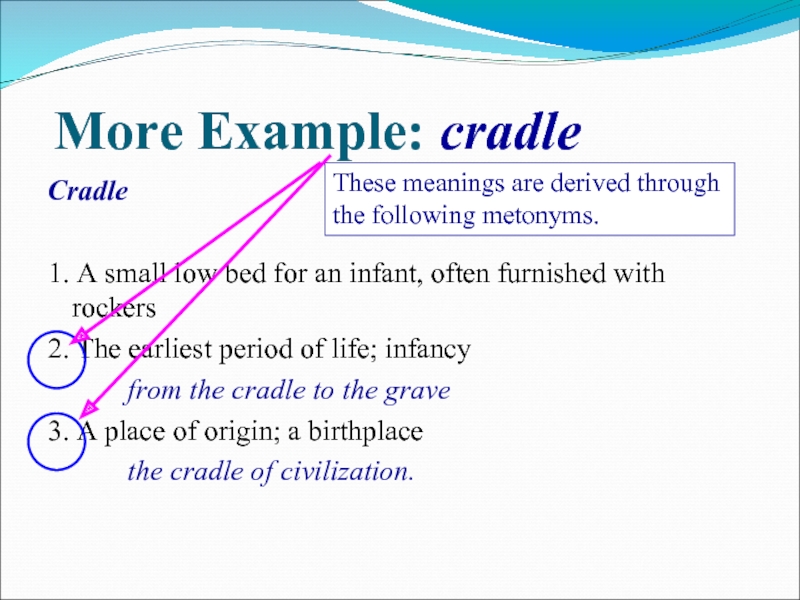Semantics refers to the study of meaning. There are two types of semantics: logical and lexical. Logical semantics is the study of reference (the symbolic relationship between language and real-world objects) and implication (the relationship between two sentences). Lexical semantics is the analysis of word meaning.
What is semantic change?
The term semantic change refers to how the meaning of words changes over time. We will cover five types of semantic change: narrowing, broadening, amelioration, pejoration, and semantic reclamation.
Let’s learn about the causes of semantic change, the different types of semantic change, and look at some examples.
The term ‘semantic shift’ can also be used to refer to the changing meanings of words.
The nature of semantic change
It is important to remember that the nature of semantic change is a gradual process. The meaning of a word doesn’t just change in an instant, it can take many years.
Semantic change often occurs as societal values change. This means that different social or ethnic groups may experience semantic change differently for different words.
Causes of semantic change
There are two different causes of semantic change. These are extralinguistic causes (not involving language) and linguistic causes (involving language).
Extralinguistic causes
Extralinguistic causes in semantic change are mainly to do with the social or historical causes of semantic change. If we break the term ‘extralinguistic’ down we can see that it refers to factors that are ‘extra’ so exist outside the language itself. Linguist Andreas Blank breaks down this factor into three main subcategories.
1. Psychological factors
Psychological factors are factors that affect how people view a word and its meaning. If a word’s original meaning is unclear, it is given new meaning. The meaning of a word may also become taboo or is used as a euphemism, eg. the term ‘pass away’ can be used to describe someone dying.
2. Sociocultural factors
This is perhaps the most common factor for extralinguistic causes of semantic change. Changes in the social, economical or political status of a country can have a significant impact on semantics. An example of this is how the meaning of words changed following the Industrial Revolution e.g. the meaning of the word ‘engine’ changed from describing general devices used in war to describing a specific mechanical device. This means that the word went the semantic change (more specifically narrowing).
3. Cultural/encyclopaedic factors
These factors refer to the cultural reasons why a word’s meaning may change. This can be because of cultural changes that lead to a change in how the word is categorised (causing a semantic change). For example, the word ‘cool’ was originally used in the context of jazz music but as the popularity of jazz increased, the word became associated with anything trendy.
| Extralinguistic causes |
| The fuzziness of a meaning |
| Cultural importance changes |
| Word becomes taboo |
| Change in a word’s popularity |
| Communicative changes |
| Changes in worldview |
Linguistic causes
Linguistic causes of semantic change are factors that occur within the system of the language spoken. Natural language changes tend to take longer than extralinguistic causes. We see this throughout history, for example, Old English took centuries to develop into Middle English.
Linguistic factors can include:
Metonymy
Metonymy occurs when the name of an object is substituted for an attribute or adjective. For example, sometimes when discussing horse racing, the tracks are referred to as ‘turf’.
Metaphors
Metaphors may also affect what certain words are associated with. The meaning words may be extended to show a connection between two similar things.
Ellipsis
This occurs when two words are consistently used together in a sentence until they acquire the same meaning. For example, the verb ‘to starve’ originally meant ‘to die’; however, it was frequently used in sentences about hunger. This led to the word’s meaning to die of hunger.
There are factors within these causes that will also impact semantic changes. Have a look at the table below to see some examples of extralinguistic and linguistic causes of semantic change.
| Linguistic causes |
| Metonymy / metaphor |
| Ellipses |
| Changes in the referents (what is being referred to) |
| Excessive length |
| Wordplay and puns |
| Disguising language / misnomers (i.e. an inaccurate name) |
Different types of semantic change
There are five major types of semantic change. These changes occur for either extralinguistic or linguistic reasons. The five major kinds of semantic change are: narrowing, broadening, amelioration, pejoration, and semantic reclamation.
Below, we will discuss the characteristics of these, and look at examples of each type of semantic change.
Narrowing
Semantic narrowing is the process by which a word’s meaning becomes less generalised (in other words more specific) over time. This means that the new meaning derives directly from the original meaning. Typically this process is caused by linguistic factors, such as ellipses, and can take many years to occur. Narrowing can also be referred to as semantic specialisation or semantic restriction.
Let’s look at two examples of semantic narrowing:
Hound
The word ‘hound’, traditionally was used to refer to any type of dog. However, over the centuries the meaning narrowed until it was only used when discussing dogs used when hunting (such as beagles and bloodhounds).

Meat
Similarly, ‘meat’, has also undergone semantic narrowing over the years. The word originally just meant ‘food’. This meaning grew more specific until the word ‘meat’ was only used when relating to one type of food (animal flesh).
Broadening
Broadening is the process in which the meaning of a word becomes more generalised over time. In order words, the word can be used in more contexts than it could originally. This is sometimes referred to as semantic generalisation.
Semantic broadening is the antonym of semantic narrowing, as the process that takes place is the opposite. However, like semantic narrowing, this process often occurs over the course of many years. Broadening can be caused by both extralinguistic and linguistic causes, such as a change in worldview, or linguistic analogy.
Below are two examples of semantic broadening:
Business
The word, ‘business’ originally was only used to refer to being busy. However, over the years, the meaning of this word broadened to refer to any type of work or job.
Cool
The term, ‘cool’, was popular within the language of jazz musicians, as it referred to a specific style of music (‘cool jazz’)! Over time, as jazz music grew in popularity, the word started to be used in other contexts.

Amelioration
Amelioration is a term that refers to when a word acquires a more positive meaning over time. It may also be referred to as semantic amelioration or semantic elevation. Typically this process occurs due to different extralinguistic reasons, such as cultural and worldview changes occurring.
The word ‘nice’ is possibly the most well-known example of amelioration. In the 1300s, the word originally meant that a person was foolish or silly. However, by the 1800s, the process of amelioration had changed this, and the word came to mean that someone was kind and thoughtful. From this, we can see that amelioration is a process that can take centuries to occur.
Sick
Many slang terms, such as ‘sick’, have undergone the process of amelioration over the years. Terms such as ‘sick’ or ‘wicked’ now also have positive connotations. This is because when used as slang, they gain a new, positive, meaning and are associated with the word, ‘cool’.
Pejoration
Pejoration is a term used to describe the process where a word that once had a positive meaning acquires a negative one. It is sometimes also referred to as semantic deterioration. This type of semantic change usually occurs due to extralinguistic causes. This can include a word becoming taboo, or being linked with a taboo within the culture.
Below, we will look at two different examples of pejoration:
Silly
The word, ‘silly’, is a common example of pejoration. In Old and Middle English, the term was used to mean that someone was happy, or spiritually blessed. However, over the centuries, this changed and by the 1500s, the word became associated with acting foolishly — as it is today!
Attitude
This word was originally used to refer to someone’s pose or posture. The meaning of the word changed, referring to someone’s way of thinking instead. From this, the term began to be used colloquially which led it to be associated with acting rude or unkind. A phrase such as ‘he has a bad attitude’ can become shortened to ‘he has an attitude’, showing that the word has gained a negative meaning.
Semantic change: reclamation
Semantic reclamation occurs when a group of people who have been oppressed reclaim (or take back) a word that has been used in the past to disparage them. The people who reclaim these words use them in a positive context and in doing this, the word is stripped of its power to disparage the group.
Semantic reclamation is often a political and controversial act, as these words become special to one particular group. Words have been reclaimed by groups such as women, ethnic minorities and the LGBTQIA community.
It is important to remember when discussing this form of semantic change that, unlike amelioration, the word may still also be used in the pejorative sense.
Words that have undergone semantic change
We’ve discussed examples of the different types of semantic change. However, here are a few more interesting examples that show the change of the English language over time!
- Girl (narrowing)- originally referred to a child of either gender. The meaning narrowed to refer to a female child.
- Playdough (broadening)- was originally the brand name. The meaning broadened to refer to the product as well.
- Fun (amelioration)- originally had negative connotations meaning ‘to cheat or trick’. The meaning now has positive connotations of amusement.
- Stench (pejoration)- originally meant ‘smell, odour, or fragrance’. The meaning now has negative connotations of a bad or unpleasant smell.
Semantic Change — Key Takeaways
- Semantic change refers to a type of language change in which the meaning of a word changes over time. Semantic change can be caused by extralinguistic and linguistic factors.
- Narrowing is when a word’s meaning becomes more specialised in time.
- Broadening is when a word becomes more generalised and gains additional meanings.
- Amelioration is when a word’s meaning changes from negative to positive.
- Pejoration is when a word’s meaning changes from positive to negative.
- Semantic reclamation is a process where a word that was once used to disparage a group of people is reclaimed by the group.
-
Three aspects of semantic
change. -
Causes of semantic change.
-
Nature of semantic change.
Metaphor and metonymy. -
Results of semantic change.
4.1.
Word meanings are liable to change in the process of historical
development
of the language. The semantic structure of a word is never static.
The number of meanings may change, with new meanings being added and
some meaning dropping out; the existing meanings may be rearranged in
the semantic structure.
When speaking about semantic
change, we must distinguish between:
-
the
causes
of semantic change, i.e. the factors bringing it about; we try to
find out why
the word has changed its meaning; -
the
nature
of semantic change; we describe the process of the change and try to
answer the question how
it has been brought about; -
the
results
of semantic change; we try to state what
has been changed.
These are three different but
closely connected aspects of the same problem.
4.2.
The causes,
or factors,
that bring about semantic changes are classified into linguistic
and extralinguistic.
By extralinguistic
causes
we mean various changes in the life of a speech community; changes in
social life, culture, science, technology, economy, etc. as reflected
in word meanings,
e.g. mill
originally was borrowed from Latin in the 1st c. B.C. in the meaning
«a building in which corn is ground into flour». When the
first textile factories appeared in Great Britain it acquired a new
meaning — «a textile factory». The cause of this semantic
change is scientific and technological progress.
Linguistic
causes
are factors that operate within the language system.
They are:
1)
Ellipsis.
In a phrase made up of two words one of them is omitted and its
meaning is transferred to the other one,
e.g. In
OE sterven (MnE to starve) meant “to die, perish». It was
often used in the phrase «sterven of hunger», the second
word was omitted and the verb acquired the new meaning n
die of hunger».
2)
Discrimination
of synonyms,
e.g. In
OE land had two meanings: «1. solid part of Earth’s surface; 2.
the territory of a nation». In ME the word country was borrowed
as a synonym to land. Then the second meaning of land came to be
expressed by country and the semantic structure of land changed.
3)
Linguistic
analogy.
If one member of a synonymic set takes on a new meaning, other
members of the same set may acquire this meaning, too,
e.g.
to catch acquired the meaning «understand»; its synonyms to
get, to qrasp also acquired the same meaning.
-
A
necessary condition of anу
semantic change is some connection or association between the old,
existing meaning and the new one. There are two
main types of association:
-
Similarity
of meaning or metaphor, -
Contiguity
of meaning or metonymy,
i.e. contact, proximity in place or time.
Metaphor
is the semantic process of associating two referents, one of which in
some way resembles the other. Metaphors may be based on similarity of
shape, size,
position, function, etc.
In various languages
metaphoric meanings of words denoting parts of the human body are
most frequent,
e.g. the
eye of a needle «hole in the end of a needle», the neck of
a bottle, the heart of a cabbage — the metaphoric meaning has
developed through similarity of the shape of two objects; the foot of
the hill — this metaphoric change is based on the similarity of
position; the hand of the clock, the Head of the school — the
metaphoric meaning is based on similarity of function.
A special group of metaphors
comprises proper nouns that have become common nouns,
e.g. a
Don Juan — «a lady-killer» , a vandal — «one who
destroys property, works of art» (originally «Germanic
tribe that in the 4th-5th c. ravaged Gaul, Spain, N. Africa, and
Rome, destroying many books and works of art»).
Metonymy
is a semantic process of associating two referents which are somehow
connected or linked in time or space. They may be connected because
they often appear in the same situation,
e.g. bench
has developed the meaning «judges» because it was on
benches that judges used to sit,
or the association may be of
material and an object made of it, etc.,
e.g. silver
– 1) certain .precious metal; 2) silver coins; 3) cutlery; 4)
silver medal,
or they may be associated
because one makes part of the other,
e.g.
factory/farm
hands «workers» (because strong, skillful hands are the
most important part of a person engaged in physical labour).
Common nouns may be derived
from proper names through metonymic transference,
e.g.
Wellingtons
«high boots covering knees in front» (from the 1st Duke of
Wellington, Br. general and statesman, who introduced them in
fashion).
4.4.
Results of semantic change may be observed in the changes of the
denotative component
and the
connotative component
of word meaning.
1) Changes
of the denotative component are of two types:
-
broadening
(or generalization,
= widening, = extension)
of
meaning,
i.e. the range of the new meaning is broader, the word is applied to
a wider range of referents,
e.g. to
arrive, borrowed from French, originally meant «to come to
shore, to land». In MnE it has developed a broader meaning «to
come». Yankee – 1) a native of New England (originally); 2) a
citizen of the USA (now).
(b) narrowing
(or specialization,
= restriction)
of
meaning.
The word comes to denote a
more limited range of referents, fewer types of them,
e.g. meat
in OE meant «any food», now it means «flesh of animals
used as food» (i.e. some special food); in OE hound meant «a
dog», now it is «a dog of special breed used in chasing
foxes».
As a
special group, we can mention proper
names derived from common nouns,
e.g. the
Border — between Scotland and England,
the
Tower — the museum in London.
2) Changes
in the connotative component of meaning are also of two types:
(a)
degeneration
(or degradation,
= deterioration)
of
meaning,
i.e. a word develops a meaning with a negative evaluative connotation
which was absent in the first meaning,
e.g. silly
«happy» (originally) — «foolish» (now);
(b)
elevation
(or amelioration)
of
meaning,
i.e. the first meaning has a negative connotation and the new one has
not,
e.g. nice
originally «foolish» — now «fine, good».
In other cases the new meaning
acquires positive connotation absent in the original meaning,
e.g. knight
«manservant» (originally) — «noble, courageous man»
(now)
The terms elevation and
degeneration of meaning are inaccurate as we actually deal not with
elevation or degradation of meanings but of referents.
Соседние файлы в предмете [НЕСОРТИРОВАННОЕ]
- #
- #
- #
- #
- #
- #
- #
- #
- #
- #
- #
Generalization, Specialization, Amelioration, and Pejoration
Updated on October 05, 2018
Stick around long enough and you’ll notice that language changes—whether you like it or not. Consider this recent report from columnist Martha Gill on the redefinition of the word literally:
It’s happened. Literally the most misused word in the language has officially changed definition. Now as well as meaning «in a literal manner or sense; exactly: ‘the driver took it literally when asked to go straight over the traffic circle,'» various dictionaries have added its other more recent usage. As Google puts it, «literally» can be used «to acknowledge that something is not literally true but is used for emphasis or to express strong feeling.» . . .
«Literally,» you see, in its development from knock-kneed, single-purpose utterance, to swan-like dual-purpose term, has reached that awkward stage. It is neither one nor the other, and it can’t do anything right.»
(Martha Gill, «Have We Literally Broken the English Language?» The Guardian [UK], August 13, 2013)
Changes in word meanings (a process called semantic shift) happen for various reasons and in various ways. Four common types of change are broadening, narrowing, amelioration, and pejoration. (For more detailed discussions of these processes, click on the highlighted terms.)
- Broadening
Also known as generalization or extension, broadening is the process by which a word’s meaning becomes more inclusive than an earlier meaning. In Old English, for instance, the word dog referred to just one particular breed, and thing meant a public assembly. In contemporary English, of course, dog can refer to many different breeds, and thing can refer to, well, anything. - Narrowing
The opposite of broadening is narrowing (also called specialization or restriction), a type of semantic change in which a word’s meaning becomes less inclusive. For example, in Middle English, deer could refer to any animal, and girl could mean a young person of either sex. Today, those words have more specific meanings. - Amelioration
Amelioration refers to the upgrading or rise in status of a word’s meaning. For example, meticulous once meant «fearful or timid,» and sensitive meant simply «capable of using one’s senses.» - Pejoration
More common than amelioration is the downgrading or depreciation of a word’s meaning, a process called pejoration. The adjective silly, for instance, once meant «blessed» or «innocent,» officious meant «hard working,» and aggravate meant to «increase the weight» of something.
What’s worth keeping in mind is that meanings don’t change over night. Different meanings of the same word often overlap, and new meanings can co-exist with older meanings for centuries. In linguistic terms, polysemy is the rule, not the exception.
«Words are by nature incurably fuzzy,» says linguist Jean Aitchison in the book Language Change: Progress Or Decay. In recent years, the adverb literally has become exceptionally fuzzy. In fact, it has slipped into the rare category of Janus words, joining terms like sanction, bolt, and fix that contain opposite or contradictory meanings.
Martha Gill concludes that there’s not much we can do about literally. The awkward stage that it’s going through may last for quite some time. «It is a moot word,» she says. «We just have to leave it up in its bedroom for a while until it grows up a bit.»
More About Language Change
- The Endless Decline of the English Language
- The Great Vowel Shift
- Inconceivable!: 5 Words That May Not Mean What You Think They Mean
- Key Dates in the History of the English Language
- Six Common Myths About Language
- Semantic Change and the Etymological Fallacy
Слайды и текст этой презентации
Слайд 1
Change of meaning. Extension, narrowing, elevation, degradation of
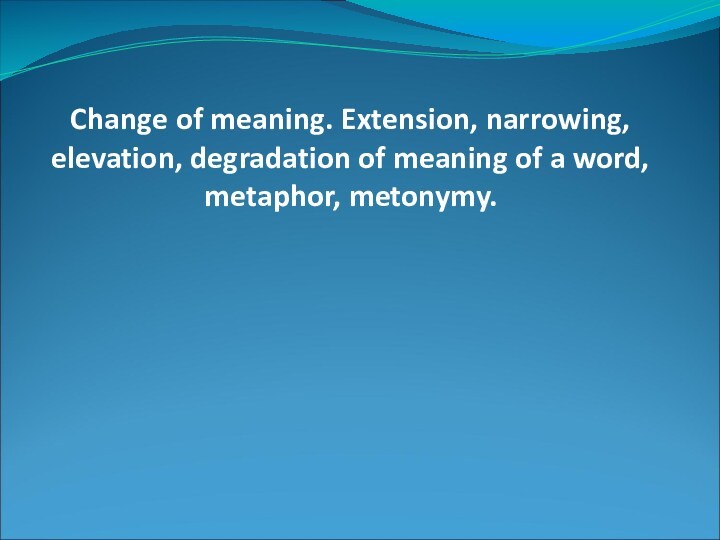
meaning of a word, metaphor, metonymy.
Слайд 2
Definition of changes of word meaning
Types of
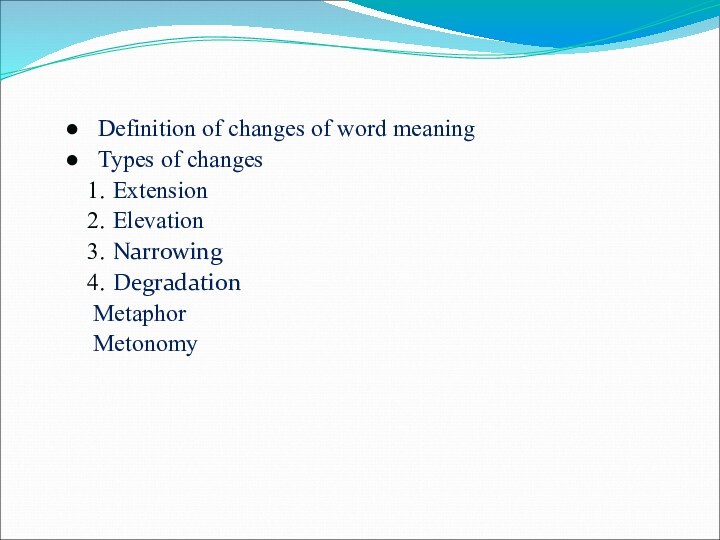
changes
Extension
Elevation
Narrowing
Degradation
Metaphor
Metonomy
Слайд 3
Changes in word meaning
When a word loses its
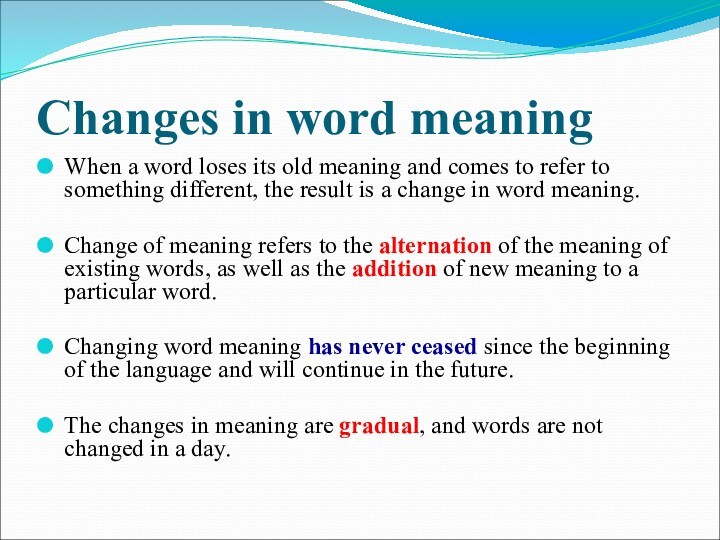
old meaning and comes to refer to something different,
the result is a change in word meaning.
Change of
meaning refers to the alternation of the meaning of existing words, as well as the addition of new meaning to a particular word.
Changing word meaning has never ceased since the beginning of the language and will continue in the future.
The changes in meaning are gradual, and words are not changed in a day.
Слайд 4
Types of Semantic Change
-Extension of meaning
-Narrowing of meaning
-Elevation
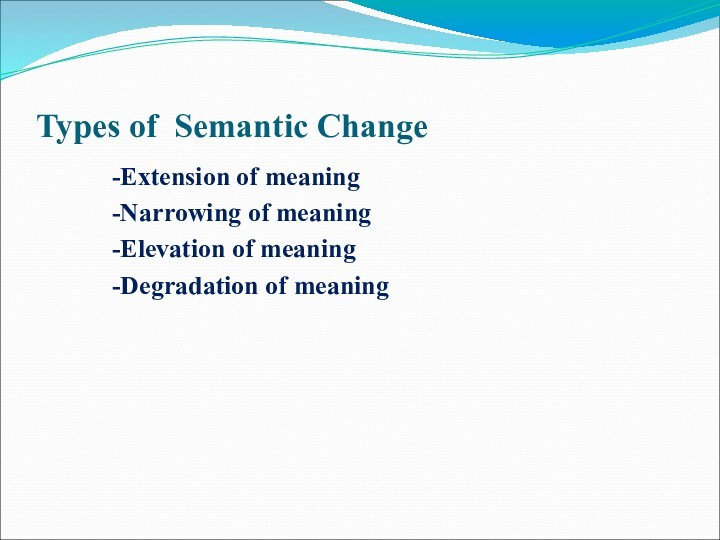
of meaning
-Degradation of meaning
Слайд 5
Extension of Meaning
—
Generalization of Meaning
It is a
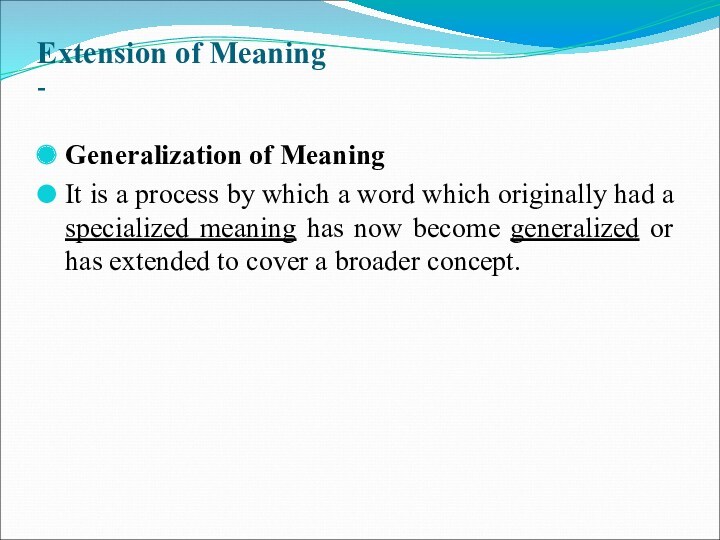
process by which a word which originally had a
specialized meaning has now become generalized or has extended to
cover a broader concept.
Слайд 6
salary
(original) a sum of money given to Roman
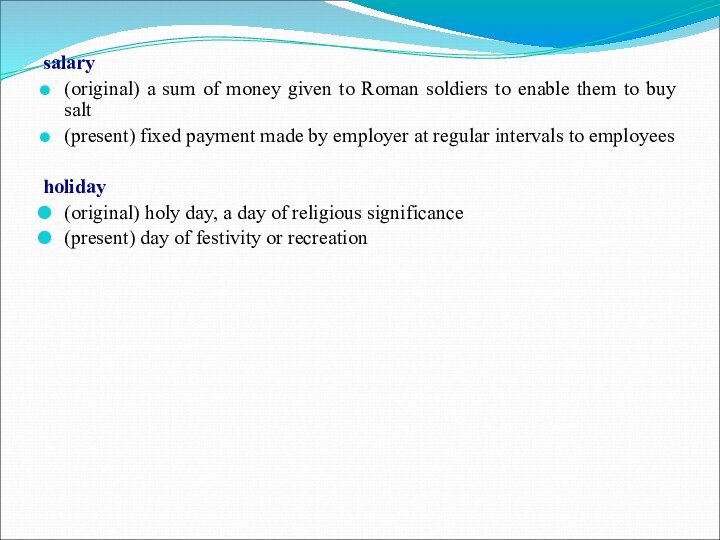
soldiers to enable them to buy salt
(present) fixed payment
made by employer at regular intervals to employees
holiday
(original) holy day,
a day of religious significance
(present) day of festivity or recreation
Слайд 7
She is such a pretty little thing.
I have
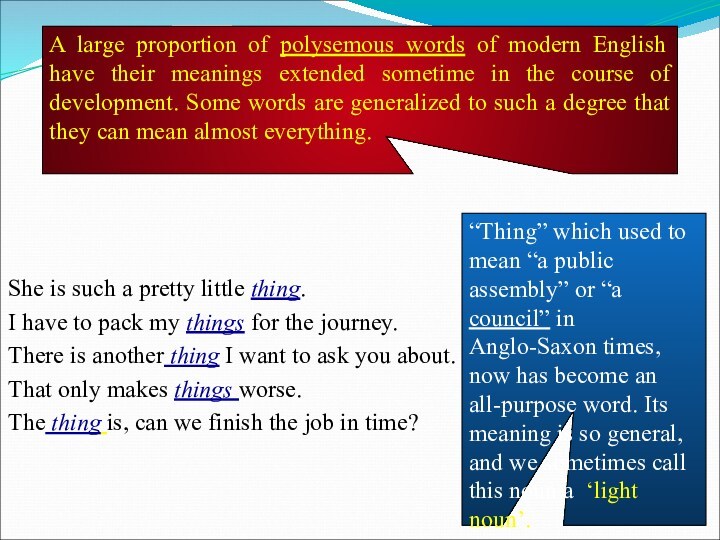
to pack my things for the journey.
There is another
thing I want to ask you about.
That only makes things
worse.
The thing is, can we finish the job in time?
A large proportion of polysemous words of modern English have their meanings extended sometime in the course of development. Some words are generalized to such a degree that they can mean almost everything.
“Thing” which used to mean “a public assembly” or “a council” in Anglo-Saxon times, now has become an all-purpose word. Its meaning is so general, and we sometimes call this noun a ‘light noun’.
Слайд 8
Generalization of meaning is also found in many
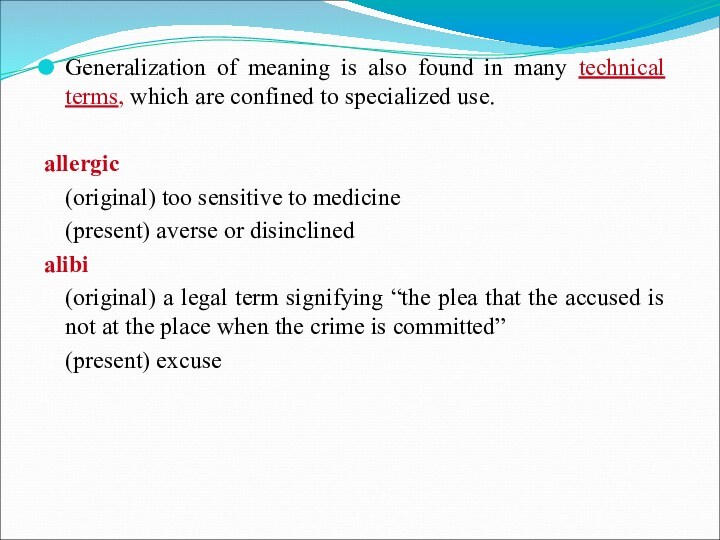
technical terms, which are confined to specialized use.
allergic
(original) too
sensitive to medicine
(present) averse or disinclined
alibi
(original) a legal term
signifying “the plea that the accused is not at the place when the crime is committed”
(present) excuse
Слайд 9
Narrowing of Meaning
It is a process by which
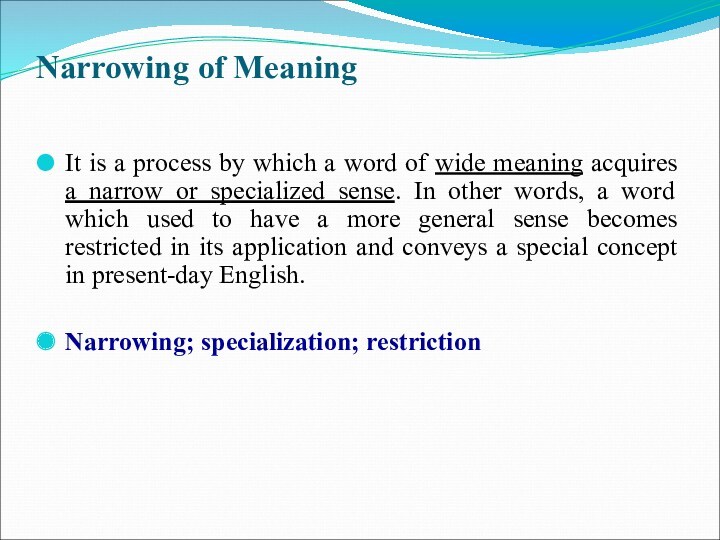
a word of wide meaning acquires a narrow or
specialized sense. In other words, a word which used to
have a more general sense becomes restricted in its application and conveys a special concept in present-day English.
Narrowing; specialization; restriction
Слайд 11
Narrowing of Meaning
For economy, some phrases are shortened
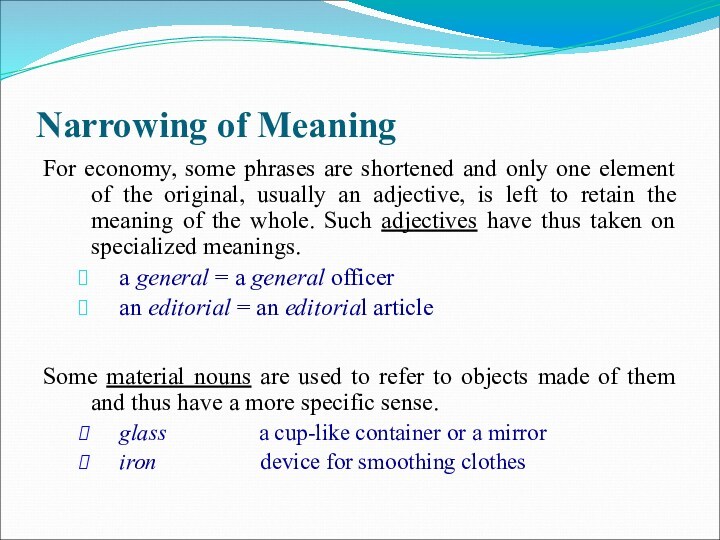
and only one element of the original, usually an
adjective, is left to retain the meaning of the whole.
Such adjectives have thus taken on specialized meanings.
a general = a general officer
an editorial = an editorial article
Some material nouns are used to refer to objects made of them and thus have a more specific sense.
glass a cup-like container or a mirror
iron device for smoothing clothes
Слайд 12
Change in associative meaning
Both extension and narrowing of
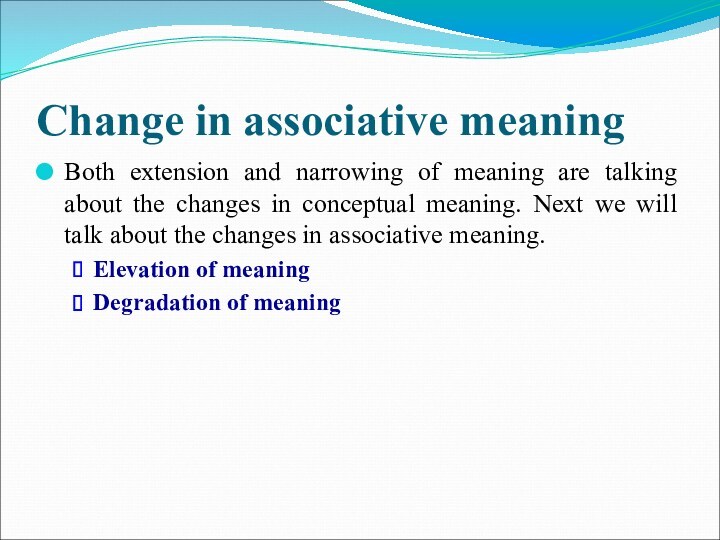
meaning are talking about the changes in conceptual meaning.
Next we will talk about the changes in associative meaning.
Elevation
of meaning
Degradation of meaning
Слайд 13
Elevation of Meaning (amelioration)
-It is the process
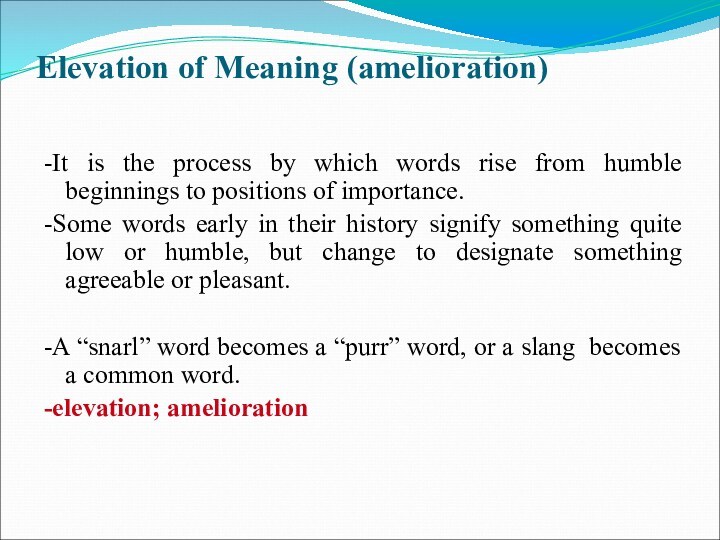
by which words rise from humble beginnings to positions
of importance.
-Some words early in their history signify something quite
low or humble, but change to designate something agreeable or pleasant.
-A “snarl” word becomes a “purr” word, or a slang becomes a common word.
-elevation; amelioration
Слайд 14
Examples of elevation
nice
-ignorant — foolish — delightful, pleasant
fond
-foolish
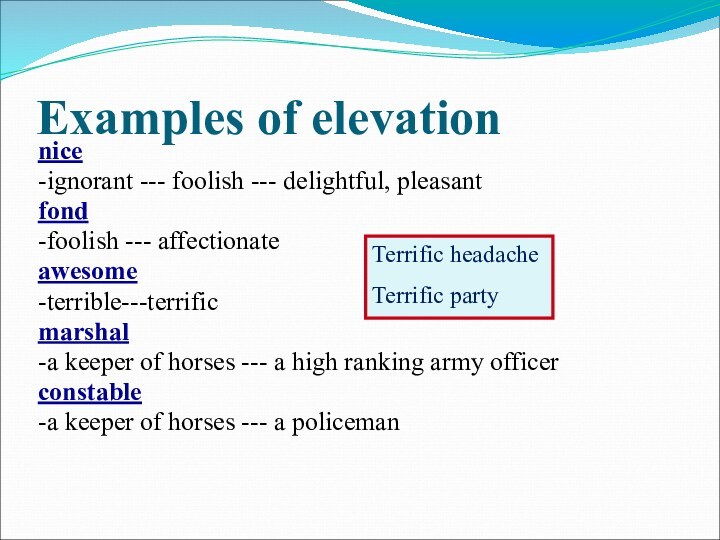
— affectionate
awesome
-terrible—terrific
marshal
-a keeper of horses — a
high ranking army officer
constable
-a keeper of horses — a policeman
Terrific
headache
Terrific party
Слайд 15
Degradation of Meaning
It is a process by
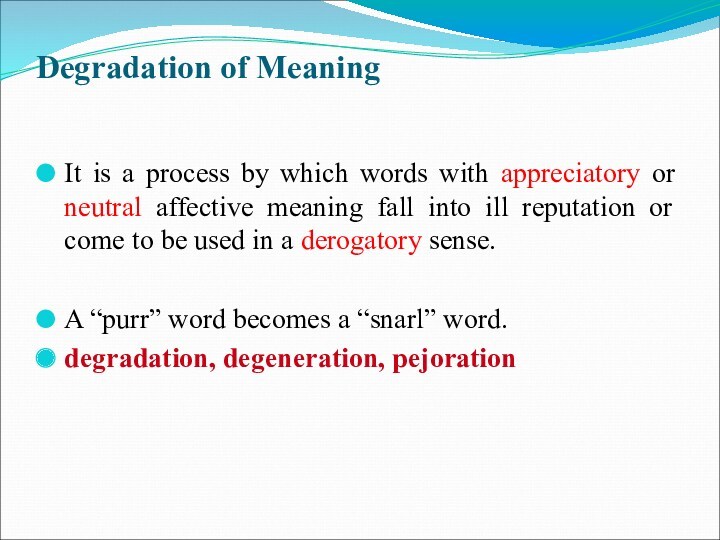
which words with appreciatory or neutral affective meaning fall
into ill reputation or come to be used in a
derogatory sense.
A “purr” word becomes a “snarl” word.
degradation, degeneration, pejoration
Слайд 16
Examples
silly
blessed and happy— innocent—-simple or simple-minded —-foolish
sad
full, satisfied,
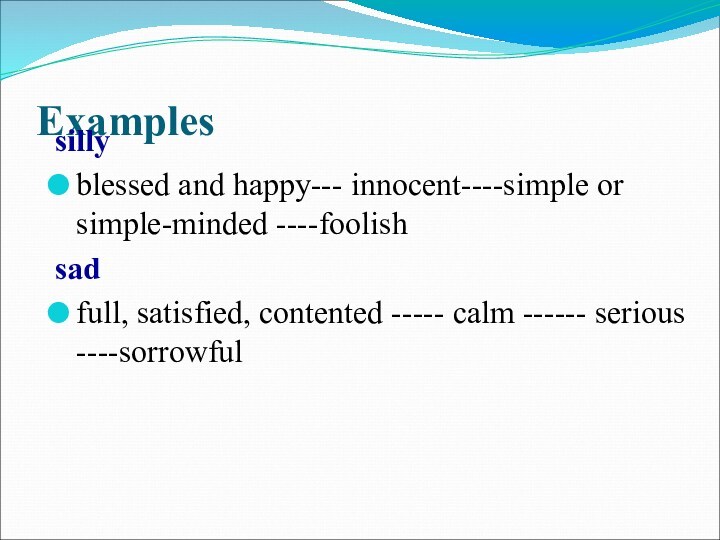
contented —— calm —— serious —-sorrowful
Слайд 17
Semantic transfer
Change in word meaning may result from
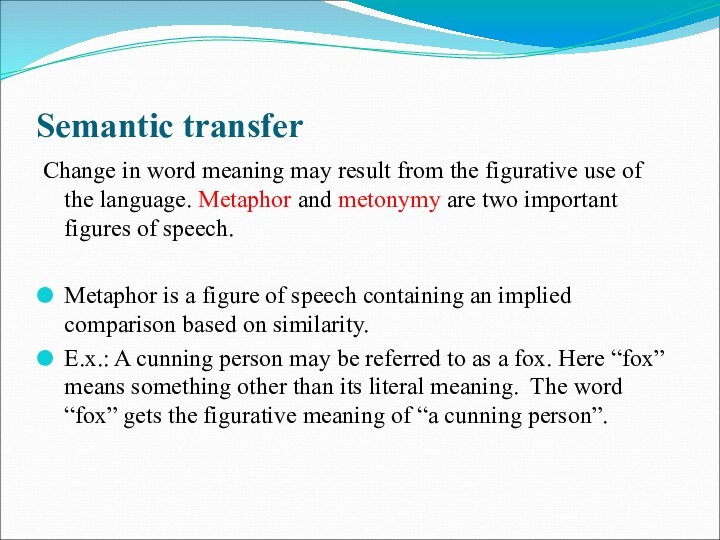
the figurative use of the language. Metaphor and metonymy
are two important figures of speech.
Metaphor is a figure of
speech containing an implied comparison based on similarity.
E.x.: A cunning person may be referred to as a fox. Here “fox” means something other than its literal meaning. The word “fox” gets the figurative meaning of “a cunning person”.
Слайд 18
Metaphor
This is also a horse, but a metaphorical
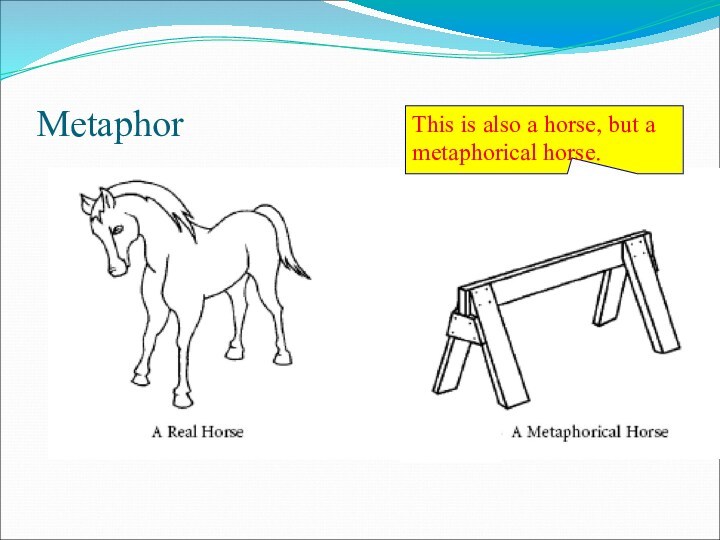
horse.
Слайд 19
Example of a linguistic metaphor: foot
foot
1. The lower
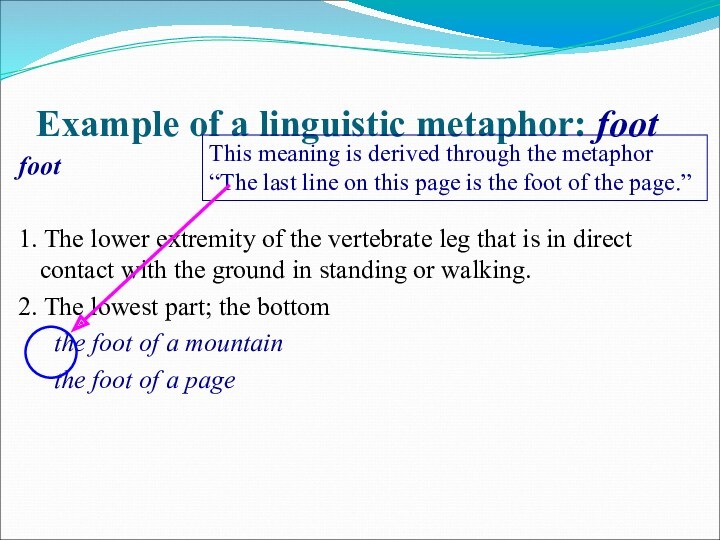
extremity of the vertebrate leg that is in direct
contact with the ground in standing or walking.
2. The lowest
part; the bottom
the foot of a mountain
the foot of a page
This meaning is derived through the metaphor
“The last line on this page is the foot of the page.”
Слайд 20
Metonymy is another important factor in semantic change.
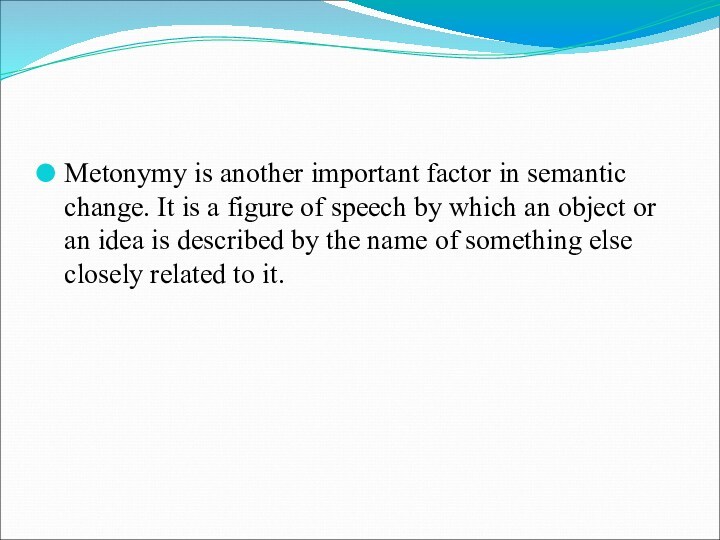
It is a figure of speech by which an
object or an idea is described by the name of
something else closely related to it.
Слайд 21
Example: seat
Seat (its sense is extended to the
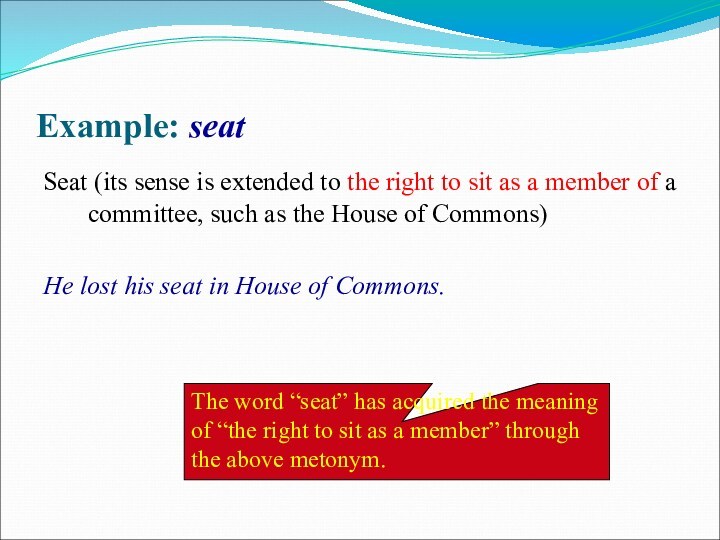
right to sit as a member of a committee,
such as the House of Commons)
He lost his seat in
House of Commons.
The word “seat” has acquired the meaning of “the right to sit as a member” through the above metonym.
Слайд 22
More Example: cradle
Cradle
1. A small low bed
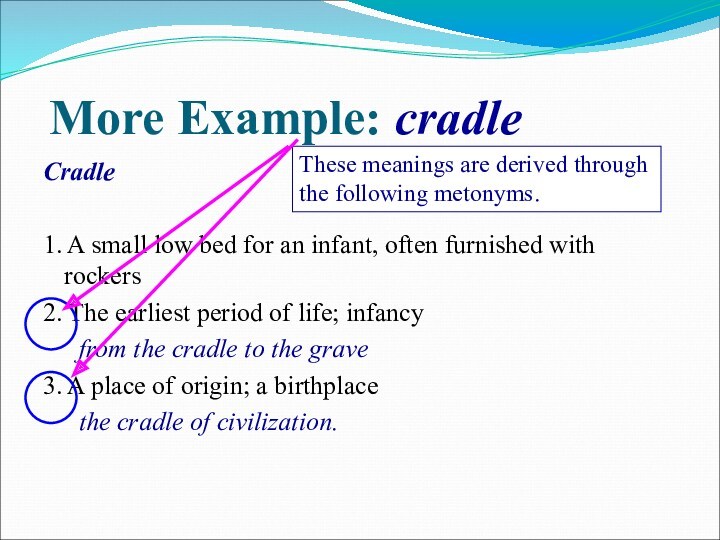
for an infant, often furnished with rockers
2. The
earliest period of life; infancy
from the cradle to the grave
3.
A place of origin; a birthplace
the cradle of civilization.
These meanings are derived through the following metonyms.
Change of meaning. Extension, narrowing, elevation, degradation of meaning of a word, metaphor, metonymy.
Definition of changes of word meaning Types of changes Extension Elevation Narrowing Degradation Metaphor Metonomy
Changes in word meaning When a word loses its old meaning and comes to refer to something different, the result is a change in word meaning. Change of meaning refers to the alternation of the meaning of existing words, as well as the addition of new meaning to a particular word. Changing word meaning has never ceased since the beginning of the language and will continue in the future. The changes in meaning are gradual, and words are not changed in a day.
Types of Change -Extension of meaning -Narrowing of meaning -Elevation of meaning -Degradation of meaning
Extension of Meaning — Generalization of Meaning It is a process by which a word which originally had a specialized meaning has now become generalized or has extended to cover a broader concept.
salary (original) a sum of money given to Roman soldiers to enable them to buy salt (present) fixed payment made by employer at regular intervals to employees holiday (original) holy day, a day of religious significance (present) day of festivity or recreation
She is such a pretty little thing. I have to pack my things for the journey. There is another thing I want to ask you about. That only makes things worse. The thing is, can we finish the job in time? A large proportion of polysemous words of modern English have their meanings extended sometime in the course of development. Some words are generalized to such a degree that they can mean almost everything. “Thing” which used to mean “a public assembly” or “a council” in Anglo-Saxon times, now has become an all-purpose word. Its meaning is so general, and we sometimes call this noun a ‘light noun’.
Generalization of meaning is also found in many technical terms, which are confined to specialized use. allergic (original) too sensitive to medicine (present) averse or disinclined alibi (original) a legal term signifying “the plea that the accused is not at the place when the crime is committed” (present) excuse
Narrowing of Meaning It is a process by which a word of wide meaning acquires a narrow or specialized sense. In other words, a word which used to have a more general sense becomes restricted in its application and conveys a special concept in present-day English. Narrowing; specialization; restriction

Narrowing of Meaning For economy, some phrases are shortened and only one element of the original, usually an adjective, is left to retain the meaning of the whole. Such adjectives have thus taken on specialized meanings. a general = a general officer an editorial = an editorial article Some material nouns are used to refer to objects made of them and thus have a more specific sense. glass a cup-like container or a mirror iron device for smoothing clothes
Change in associative meaning Both extension and narrowing of meaning are talking about the changes in conceptual meaning. Next we will talk about the changes in associative meaning. Elevation of meaning Degradation of meaning
Elevation of Meaning (amelioration) -It is the process by which words rise from humble beginnings to positions of importance. -Some words early in their history signify something quite low or humble, but change to designate something agreeable or pleasant. -A “snarl” word becomes a “purr” word, or a slang becomes a common word. -elevation; amelioration
Examples of elevation nice -ignorant — foolish — delightful, pleasant fond -foolish — affectionate awesome -terrible—terrific marshal -a keeper of horses — a high ranking army officer constable -a keeper of horses — a policeman Terrific headache Terrific party
Degradation of Meaning It is a process by which words with appreciatory or neutral affective meaning fall into ill reputation or come to be used in a derogatory sense. A “purr” word becomes a “snarl” word. degradation, degeneration, pejoration
Examples silly blessed and happy— innocent—-simple or simple-minded —-foolish sad full, satisfied, contented —— calm —— serious —-sorrowful
Figurative use of words Change in word meaning may result from the figurative use of the language. Metaphor and metonymy are two important figures of speech. Metaphor is a figure of speech containing an implied comparison based on similarity. E.x.: A cunning person may be referred to as a fox. Here “fox” means something other than its literal meaning. The word “fox” gets the figurative meaning of “a cunning person”.
Metaphor This is also a horse, but a metaphorical horse.
Example: foot foot 1. The lower extremity of the vertebrate leg that is in direct contact with the ground in standing or walking. 2. The lowest part; the bottom the foot of a mountain the foot of a page This meaning is derived through the metaphor “The last line on this page is the foot of the page.”
Metonymy is another important factor in semantic change. It is a figure of speech by which an object or an idea is described by the name of something else closely related to it.
Example: seat Seat (its sense is extended to the right to sit as a member of a committee, such as the House of Commons) He lost his seat in House of Commons. The word “seat” has acquired the meaning of “the right to sit as a member” through the above metonym.
More Example: cradle Cradle 1. A small low bed for an infant, often furnished with rockers 2. The earliest period of life; infancy from the cradle to the grave 3. A place of origin; a birthplace the cradle of civilization. These meanings are derived through the following metonyms.
- Главная
- Разное
- Дизайн
- Бизнес и предпринимательство
- Аналитика
- Образование
- Развлечения
- Красота и здоровье
- Финансы
- Государство
- Путешествия
- Спорт
- Недвижимость
- Армия
- Графика
- Культурология
- Еда и кулинария
- Лингвистика
- Английский язык
- Астрономия
- Алгебра
- Биология
- География
- Геометрия
- Детские презентации
- Информатика
- История
- Литература
- Маркетинг
- Математика
- Медицина
- Менеджмент
- Музыка
- МХК
- Немецкий язык
- ОБЖ
- Обществознание
- Окружающий мир
- Педагогика
- Русский язык
- Страхование
- Технология
- Физика
- Философия
- Химия
- Шаблоны, картинки для презентаций
- Экология
- Экономика
- Юриспруденция
Содержание
-
1.
Change of meaning. Extension, narrowing, elevation, degradation of meaning of a word, metaphor, metonymy -
2.
Definition of changes of word meaning -
3.
Changes in word meaning When a word -
4.
Types of Semantic Change -Extension of meaning -
5.
Extension of Meaning
— Generalization of -
6.
salary (original) a sum of money given -
7.
She is such a pretty little thing. -
8.
Generalization of meaning is also found in -
9.
Narrowing of Meaning
It is a -
11.
Narrowing of Meaning For economy, some phrases -
12.
Change in associative meaning Both extension and -
13.
Elevation of Meaning (amelioration)
-It -
14.
Examples of elevation nice -ignorant — -
15.
Degradation of Meaning
It is -
16.
Examples silly blessed and happy— innocent—-simple or -
17.
Semantic transfer Change in word meaning may -
18.
Metaphor This is also a horse, but a metaphorical horse. -
19.
Example of a linguistic metaphor: foot foot -
20.
Metonymy is another important factor in -
21.
Example: seat Seat (its sense is -
22.
More Example: cradle Cradle 1.
Definition of changes of word meaning Types of changes Extension Elevation Narrowing Degradation Metaphor Metonomy
Слайд 1Change of meaning. Extension, narrowing, elevation, degradation of meaning of a
word, metaphor, metonymy.

Слайд 2
Definition of changes of word meaning
Types of changes
Extension
Elevation
Narrowing
Degradation
Metaphor
Metonomy
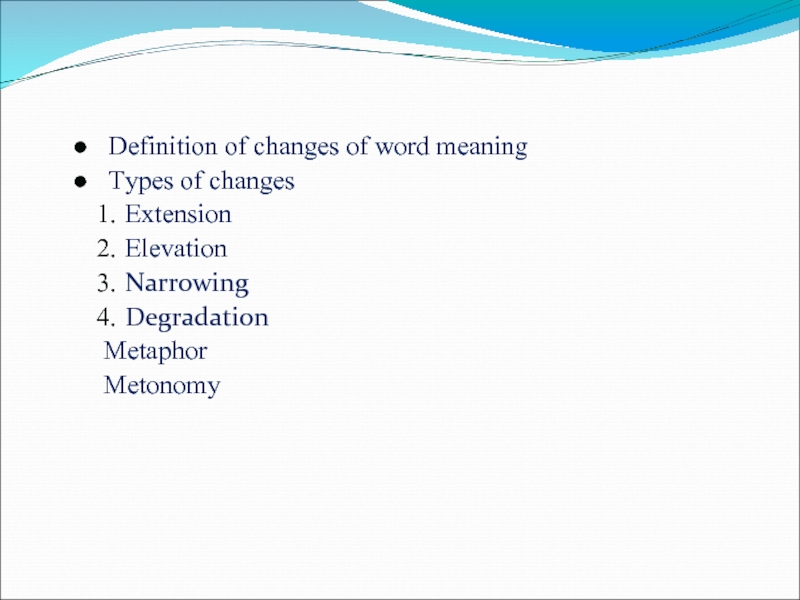
Слайд 3Changes in word meaning
When a word loses its old meaning and
comes to refer to something different, the result is a change in word meaning.
Change of meaning refers to the alternation of the meaning of existing words, as well as the addition of new meaning to a particular word.
Changing word meaning has never ceased since the beginning of the language and will continue in the future.
The changes in meaning are gradual, and words are not changed in a day.
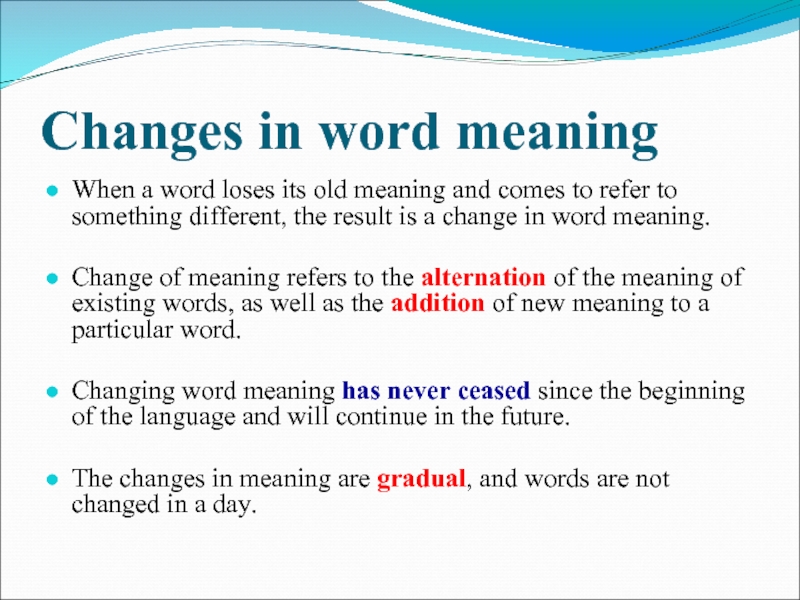
Слайд 4Types of Semantic Change
-Extension of meaning
-Narrowing of meaning
-Elevation of meaning
-Degradation of
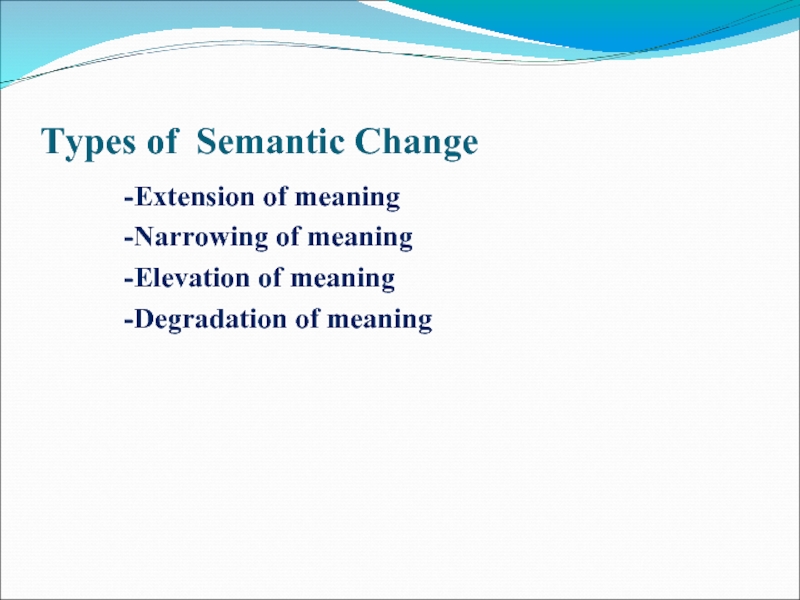
Слайд 5Extension of Meaning
—
Generalization of Meaning
It is a process by which
a word which originally had a specialized meaning has now become generalized or has extended to cover a broader concept.
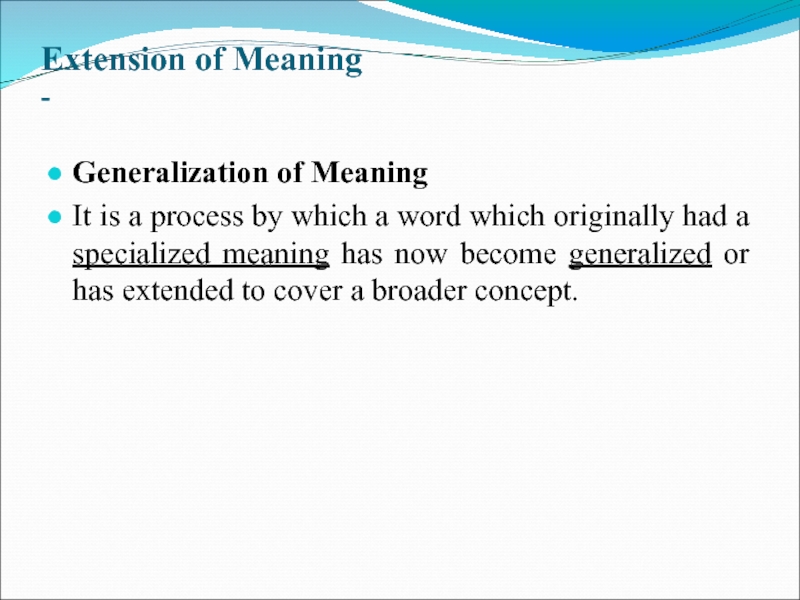
Слайд 6salary
(original) a sum of money given to Roman soldiers to enable
them to buy salt
(present) fixed payment made by employer at regular intervals to employees
holiday
(original) holy day, a day of religious significance
(present) day of festivity or recreation

Слайд 7She is such a pretty little thing.
I have to pack my
things for the journey.
There is another thing I want to ask you about.
That only makes things worse.
The thing is, can we finish the job in time?
A large proportion of polysemous words of modern English have their meanings extended sometime in the course of development. Some words are generalized to such a degree that they can mean almost everything.
“Thing” which used to mean “a public assembly” or “a council” in Anglo-Saxon times, now has become an all-purpose word. Its meaning is so general, and we sometimes call this noun a ‘light noun’.
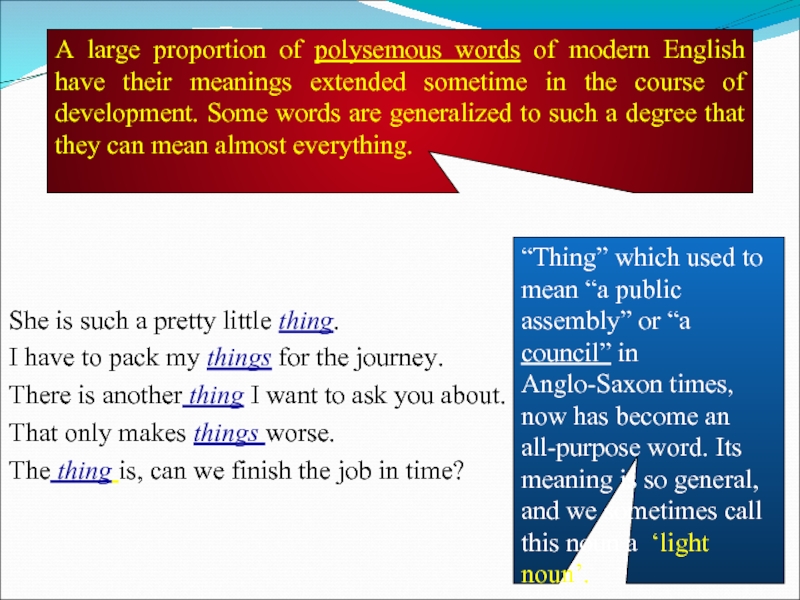
Слайд 8Generalization of meaning is also found in many technical terms, which
are confined to specialized use.
allergic
(original) too sensitive to medicine
(present) averse or disinclined
alibi
(original) a legal term signifying “the plea that the accused is not at the place when the crime is committed”
(present) excuse
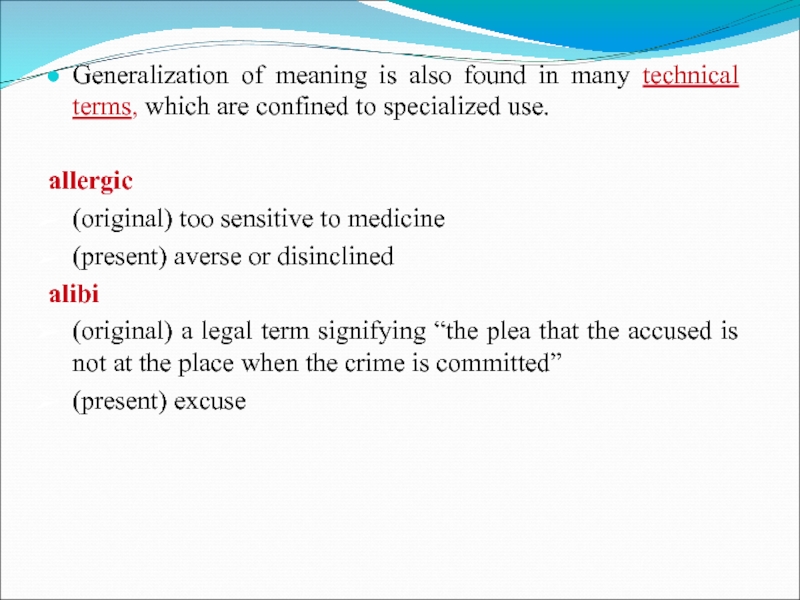
Слайд 9Narrowing of Meaning
It is a process by which a word of
wide meaning acquires a narrow or specialized sense. In other words, a word which used to have a more general sense becomes restricted in its application and conveys a special concept in present-day English.
Narrowing; specialization; restriction
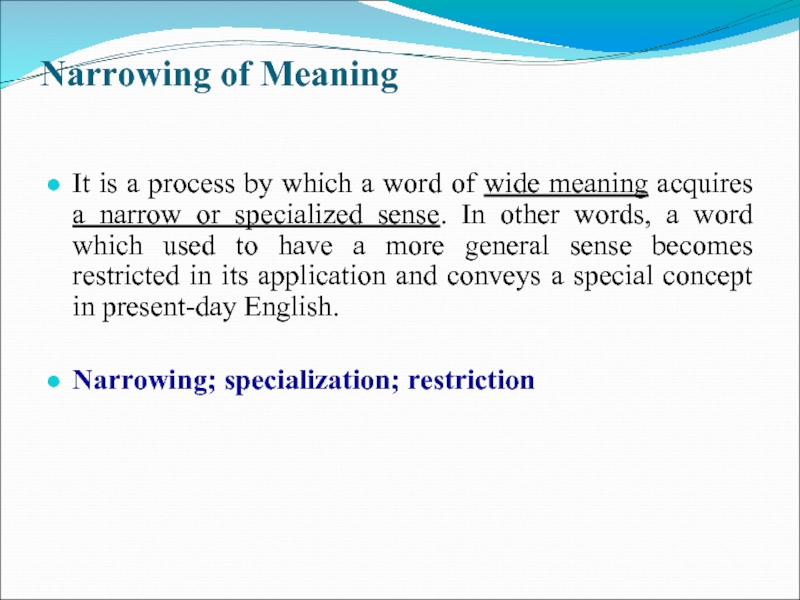
Слайд 11Narrowing of Meaning
For economy, some phrases are shortened and only one
element of the original, usually an adjective, is left to retain the meaning of the whole. Such adjectives have thus taken on specialized meanings.
a general = a general officer
an editorial = an editorial article
Some material nouns are used to refer to objects made of them and thus have a more specific sense.
glass a cup-like container or a mirror
iron device for smoothing clothes
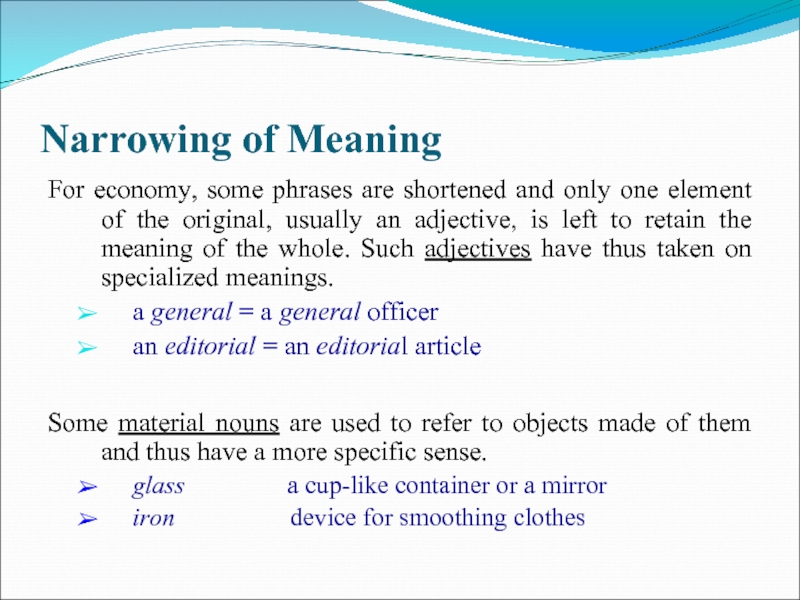
Слайд 12Change in associative meaning
Both extension and narrowing of meaning are talking
about the changes in conceptual meaning. Next we will talk about the changes in associative meaning.
Elevation of meaning
Degradation of meaning
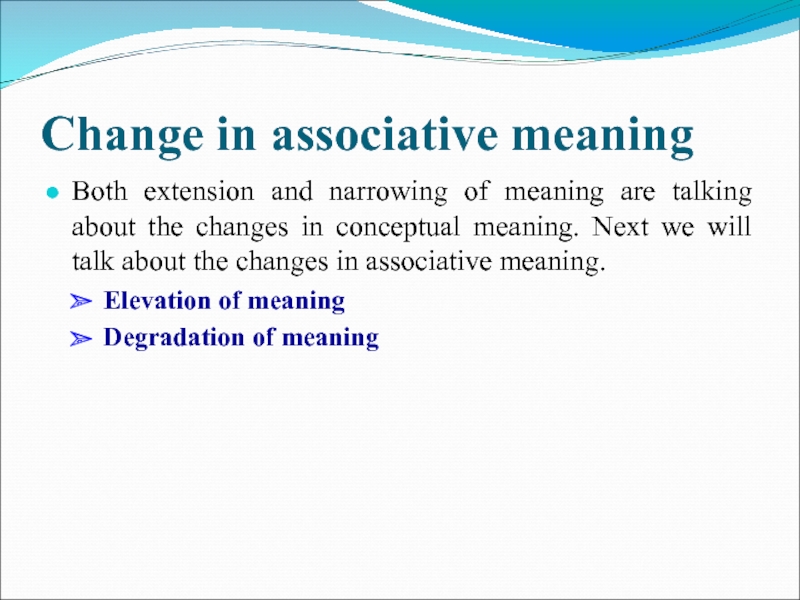
Слайд 13Elevation of Meaning (amelioration)
-It is the process by which words
rise from humble beginnings to positions of importance.
-Some words early in their history signify something quite low or humble, but change to designate something agreeable or pleasant.
-A “snarl” word becomes a “purr” word, or a slang becomes a common word.
-elevation; amelioration
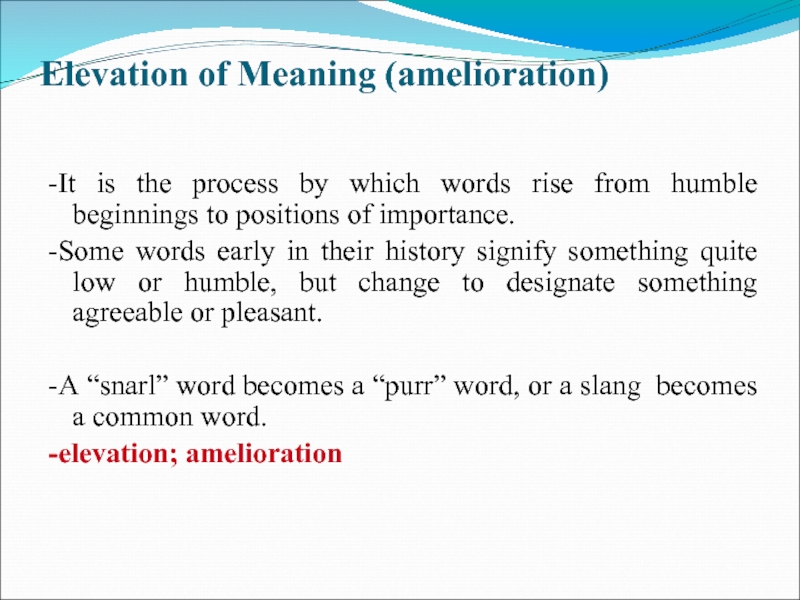
Слайд 14Examples of elevation
nice
-ignorant — foolish — delightful, pleasant
fond
-foolish — affectionate
awesome
-terrible—terrific
marshal
-a keeper of horses — a high ranking army officer
constable
-a keeper of horses — a policeman
Terrific headache
Terrific party
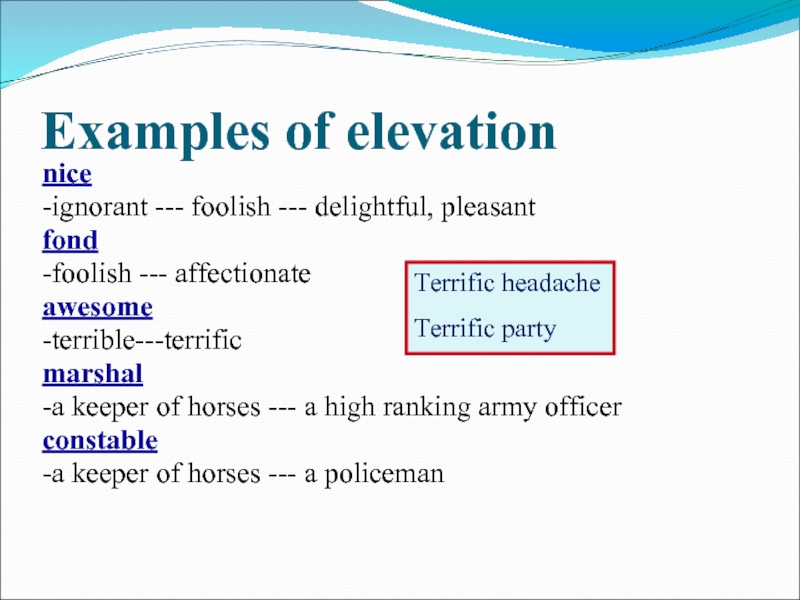
Слайд 15Degradation of Meaning
It is a process by which words with
appreciatory or neutral affective meaning fall into ill reputation or come to be used in a derogatory sense.
A “purr” word becomes a “snarl” word.
degradation, degeneration, pejoration
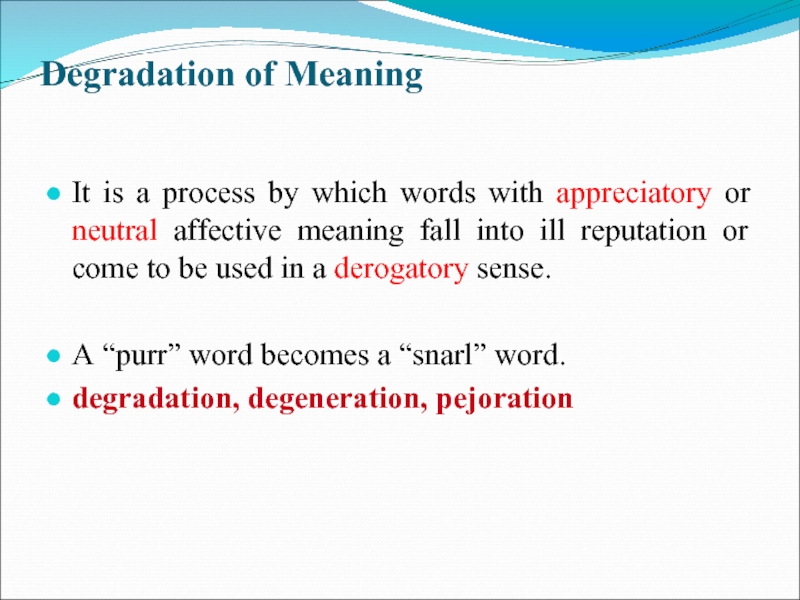
Слайд 16Examples
silly
blessed and happy— innocent—-simple or simple-minded —-foolish
sad
full, satisfied, contented —— calm
—— serious —-sorrowful
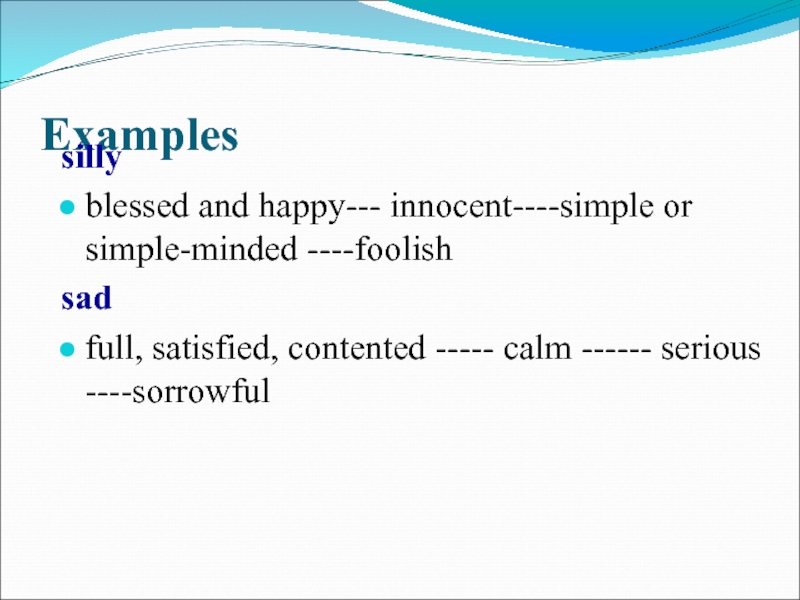
Слайд 17Semantic transfer
Change in word meaning may result from the figurative use
of the language. Metaphor and metonymy are two important figures of speech.
Metaphor is a figure of speech containing an implied comparison based on similarity.
E.x.: A cunning person may be referred to as a fox. Here “fox” means something other than its literal meaning. The word “fox” gets the figurative meaning of “a cunning person”.
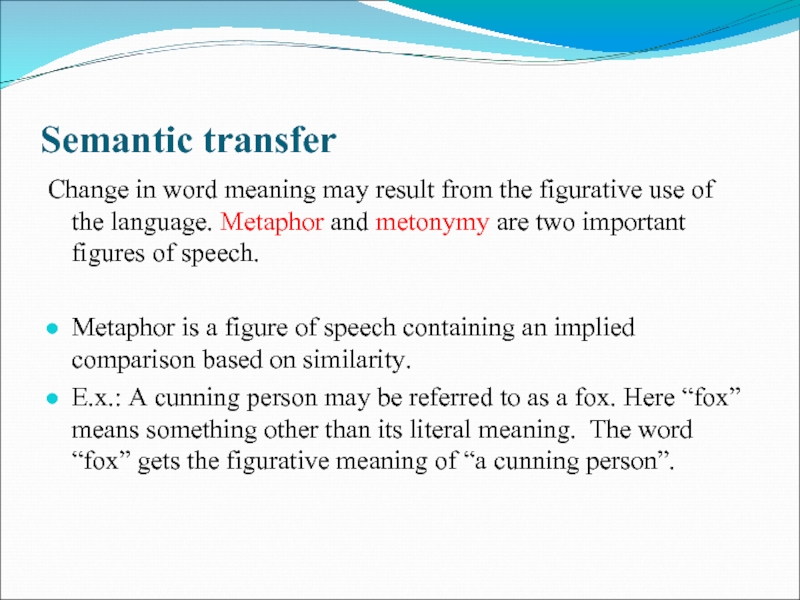
Слайд 18Metaphor
This is also a horse, but a metaphorical horse.
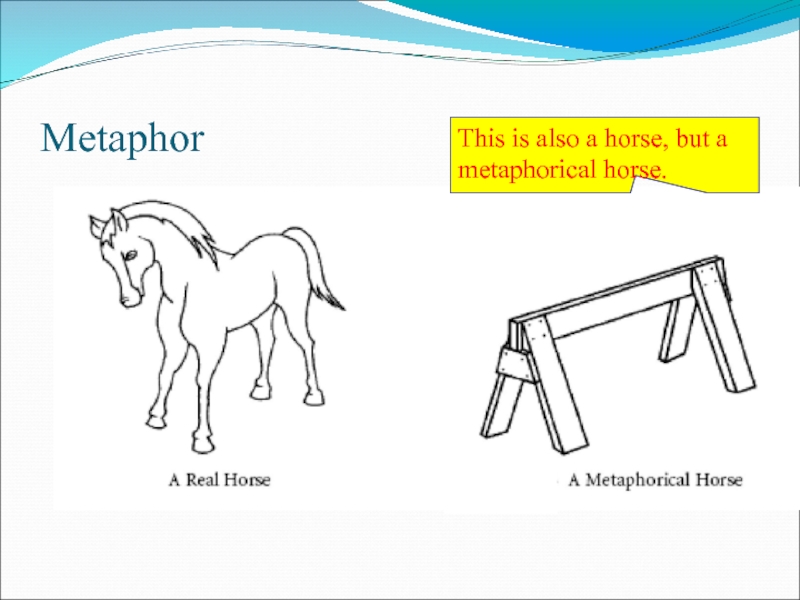
Слайд 19Example of a linguistic metaphor: foot
foot
1. The lower extremity of the
vertebrate leg that is in direct contact with the ground in standing or walking.
2. The lowest part; the bottom
the foot of a mountain
the foot of a page
This meaning is derived through the metaphor
“The last line on this page is the foot of the page.”
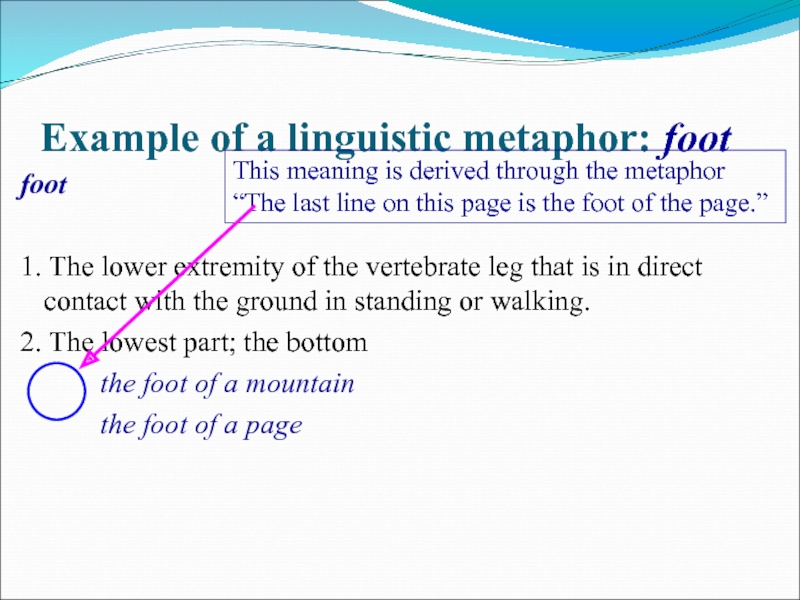
Слайд 20
Metonymy is another important factor in semantic change. It is a
figure of speech by which an object or an idea is described by the name of something else closely related to it.
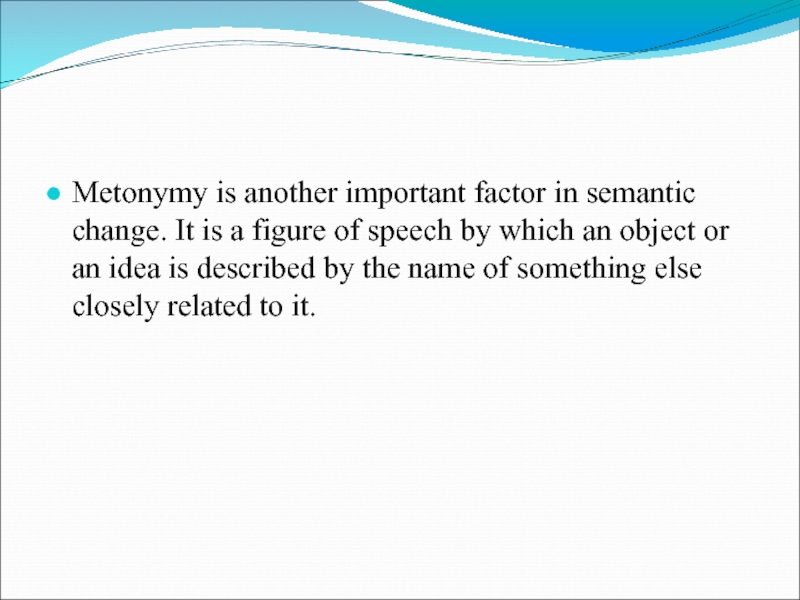
Слайд 21Example: seat
Seat (its sense is extended to the right to sit
as a member of a committee, such as the House of Commons)
He lost his seat in House of Commons.
The word “seat” has acquired the meaning of “the right to sit as a member” through the above metonym.
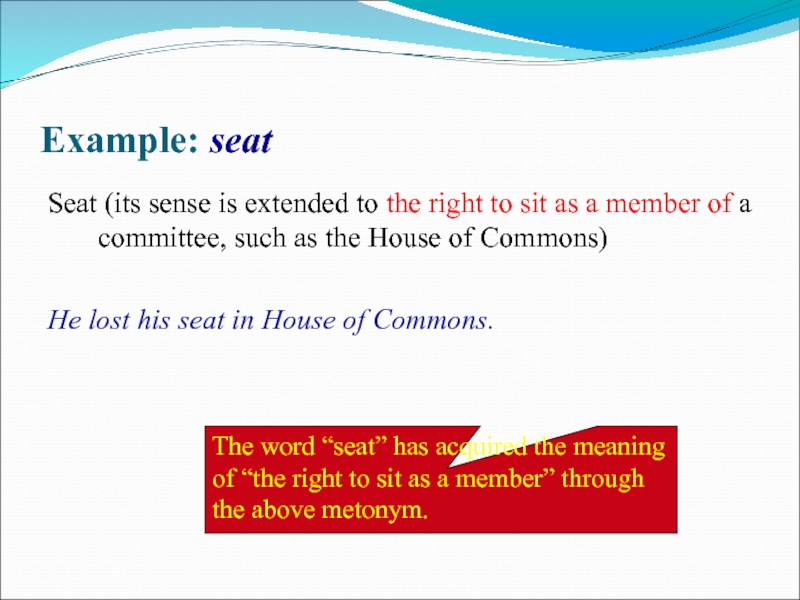
Слайд 22 More Example: cradle
Cradle
1. A small low bed for an infant,
often furnished with rockers
2. The earliest period of life; infancy
from the cradle to the grave
3. A place of origin; a birthplace
the cradle of civilization.
These meanings are derived through the following metonyms.
